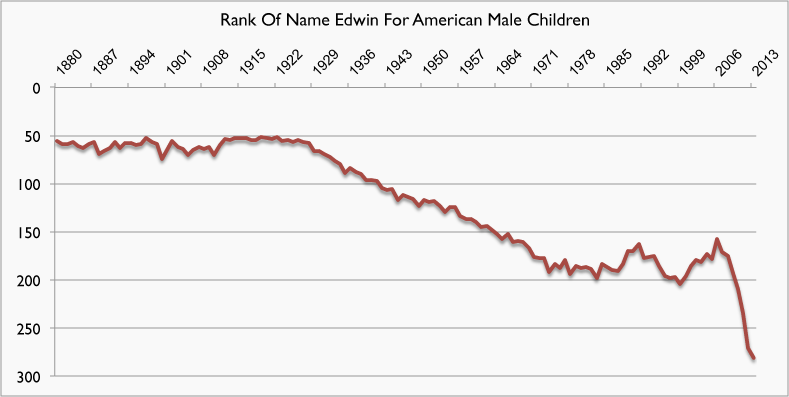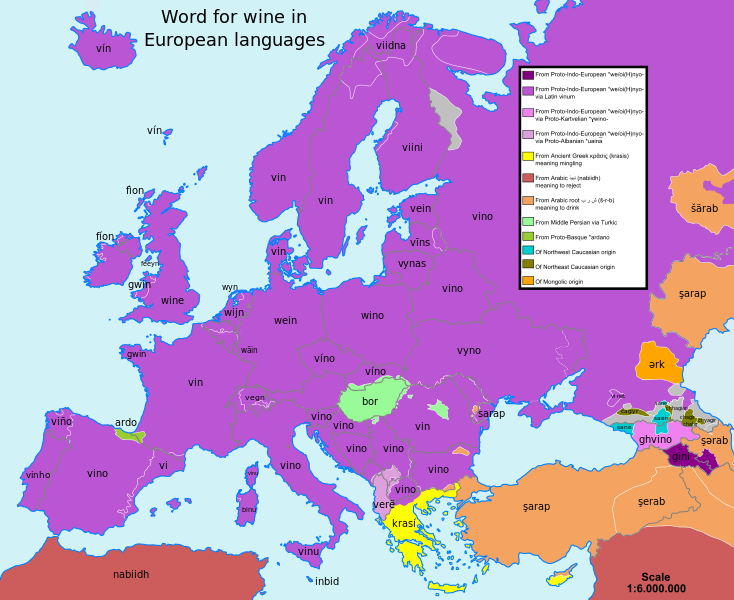With over 8,000 years of drinking history, it’s not surprising that many of the words we use when discussing wine can trace their etymological origins into the distant past. As we explored how various wine-related words came to be, we were surprised by how many seemingly random words also trace their names to the beverage we know as wine in contemporary English. Grab a glass of wine – in the name of education! – and do some etymological exploring.
Alcohol
Alcohol finds its source in the similarly sounding Arabic phrase for metallic powder used as eye shadow, Al-Kuhul. Loaned into Medieval Latin it found its way to the Old French word alcool. In the sixteenth century the word’s meaning evolved to cover to any sort of sublimated powder. Finally, in the mid-seventeenth century the word evolved once again to refer exclusively to distilled or rectified spirits.
Claret
For many centuries the English were the primary consumers of Bordeaux’s wines. Their word for these typically blended wines traces its history through Middle English back to the Old French claré: “wine mixed with honey and herbs or spices.”
Libation
When we refer to wine or other alcohol beverages as libations we typically do so in a positive, celebratory context. Libation’s Latin origins explain this. Libationem meant to make a drink offering, specifically pouring out wine to honor a god.
Merlot
Most of the world’s well-known wine varietals derive their name from the location where they were discovered or made famous. Not Merlot. The name traces its meaning to a word of the dialect of Occitan called Gascon. This relatively obscure Romance language is closely related to Catalan and still spoken in a few regions of France. The Gascon word merlau refers to a ‘little blackbird.’ Whether this refers to the color of the Merlot grape or its popularity while on the vine with small birds is an open question.
Plonk
When we call wine plonk, we generally mean any lousy wine (think mass-produced jug wine). You’re more likely to hear this word uttered in England than in America, which makes sense given its origins. English soldiers fighting in France during WWI soothed the misery of war downing glasses of whatever vin blanc they could find, which was altered to plonk as it entered the military jargon of the day. While the soldiers certainly drank red wine as well, it’s this alteration of vin blanc that stuck.
Sommelier
Sommelier, a loanword from French, has an odd original meaning, though the evolution of that meaning does follow a logical path. In Middle French the word referred to the court official who oversaw the transportation of supplies, which obviously included wine. In that era, those supplies would be dragged along by pack animals. Going back further we arrive at saumalier, the Provençal (another dialect of Occitan) name for a pack animal ‘driver.’
Syrah & Shiraz
The red grape we call both Syrah and Shiraz has a confusing history. The most common explanation for the alternate name Shiraz is due to the way Australians pronounce Syrah, or, as some would insist, the way we imagine the Australians pronounce it. An alternate explanation is that the grape finds its origin in Shiraz, a city in modern day Iran. While Shiraz was, in its day (the ninth to seventeenth centuries), a famous wine producing city, shirazi wines were all of the white variety. This makes for an interesting coincidence, but nothing more.
Bonus Words
Butler
The name for the head service man of the house evolved from the Old French boteillier, who was the cupbearer, specifically the ‘officer in charge of wine.’ Boteillier itself is closely related to the Old French word for a wine vessel, a boteille.
Edwin
The English name Edwin is the combination of the Old English words ead, meaning rich or blessed, and wine, meaning friend. So, Edwin was your rich friend. Sound like any Edwin you know? As this chart of male names in America shows, the answer is increasingly no.

Moist
We can trace the etymological history of the word moist in two directions. We’ll go with the history that doesn’t start at mucidus, the Latin word meaning moldy. Instead we’ll wind our way back through Middle English and Middle French to the Latin mustum, meaning new, fresh wine. This leads us to our next, unexpected word with wine-soaked origins.
Mustard
What does mustard have to do with wine? If you’re thinking of the perfect pairing of wine and a charcuterie plate, nice try, but that’s off the mark. When we began to enjoy mustard thousands of years ago the recipe included vinegar (which we’ll get to in a moment), as it often does today. However, when mustard received its modern name in the Middle Ages, must was used in place of vinegar. Must, if you’re not familiar, refers to the freshly pressed grape juice that has yet to be fermented into wine.
Vapid
We count five uses of the word vapid in the seventh edition of Robert Parker’s Wine Buyer’s Guide. For example, in reference to the production methods of the vast majority of Chardonnay-producing wineries in California: “The results are tart, vapid wines of no interest.” We wonder if Mr. Parker, no stranger to Latin as a former lawyer, knows the word’s wine-related origins. Vapid traces its name to the Latin vapidus, meaning flat or insipid, along with vappa, the word for a ‘flat wine,’ which has nearly turned into vinegar. Vapidus’ figurative meaning? A worthless person.
Vinegar
The word Vinegar can be traced through the Old French vinaigre, back to two Latin words. Combine vinum, meaning wine, with aigre, meaning sour and you get sour wine, which is what wine, rarely stored properly, quickly turned into in Roman times.
When we talk about Old World wine we’re usually referring to Europe. As there are multiple languages used throughout the continent, wine goes by a few names. Here’s a map:

Header image via Shutterstock.com

